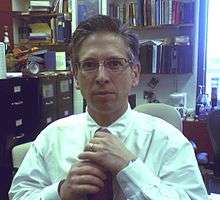Paul Weiss (nanoscientist)
| Paul S. Weiss | |
|---|---|
 | |
| Born | October 10, 1959 |
| Residence | Los Angeles, California |
| Citizenship | U.S. Citizen |
| Alma mater | MIT and UC Berkeley |
| Scientific career | |
| Fields | Nanoscience |
| Doctoral advisor | Yuan T. Lee |
| Notes | |
|
Extended information available on Weiss' biography page. | |
Paul S. Weiss (born October 10, 1959) is a leading American nanoscientist at the University of California, Los Angeles. He holds numerous positions, including UC Presidential Chair, Distinguished Professor of Chemistry and Biochemistry[1] and of Materials Science and Engineering,[2] and founder and editor-in-chief of ACS Nano.[3] From 2009–2014 he held the Fred Kavli Chair in NanoSystems Sciences and was the director of the California NanoSystems Institute.[4] Weiss has co-authored over 300 research publications and US and international patents.
Weiss received his bachelor of science and master of science degrees from the Massachusetts Institute of Technology in 1980 and his Ph.D. in chemistry from the University of California, Berkeley in 1986. He was a post-doctoral researcher at Bell Labs from 1986 to 1988 and a visiting scientist at IBM Research at Almaden from 1988 to 1989. From 1989 until 2009, Weiss was a professor at Pennsylvania State University, rising from Assistant Professor to Distinguished Professor of Chemistry and Physics. He moved to UCLA in 2009.[5]
The Weiss Group has traditionally focused on understanding and controlling chemistry and materials at the smallest scales. They demonstrated how atoms and molecules communicate through substrates on which they sit at greater than chemical distances. They have exploited self-assembled monolayers as well-defined environments to isolate single molecules for measurements of electron transport, as a means to improve nanofabrication techniques and as a way to isolate probe molecules on biospecific capture surfaces. The group has now diversified its focus to encompass projects that have wide-ranging impact in nanoscience and other fields, including nanobiosensor arrays for brain research and studying the microbiome. Weiss led the technology roadmap for the BRAIN Initiative[6][7] and contributed to the roadmap for the National Microbiome Initiative,[8] both published in ACS Nano.
Personal life
He is married to and collaborates with Anne Andrews, a Professor of Psychiatry and Biobehavioral Sciences at the University of California Los Angeles.
Awards and honors
- 1996 American Chemical Society Nobel Laureate Signature Award for Graduate Education in Chemistry
- 2015 American Chemical Society Award in Colloid and Surface Chemistry
- 2016 American Chemical Society Tolman Medal[9]
References
- ↑ "UCLA Chemistry and Biochemistry Faculty". Retrieved 2017-05-08.
- ↑ "UCLA Materials Science and Engineering Faculty". Retrieved 2017-05-08.
- ↑ "Editor Profile". pubs.acs.org. Retrieved 2016-10-10.
- ↑ "People - CNSI". faculty.cnsi.ucla.edu. Retrieved 2016-10-10.
- ↑ "Editor Profile". pubs.acs.org. Retrieved 2016-10-10.
- ↑ "President Obama Announces the BRAIN Initiative". pubs.acs.org. Retrieved 2017-05-08.
- ↑ "Nanotools for Neuroscience and Brain Activity Mapping". pubs.acs.org. Retrieved 2017-05-08.
- ↑ "Tools for the Microbiome: Nano and Beyond". pubs.acs.org. Retrieved 2017-05-08.
- ↑ "2016 Tolman Medalist Professor Paul S. Weiss". Retrieved 2017-05-08.
External links
- Profile at Pennsylvania State University
- Weiss Research Group website
- Weiss explaining research done by the Weiss Group (video)